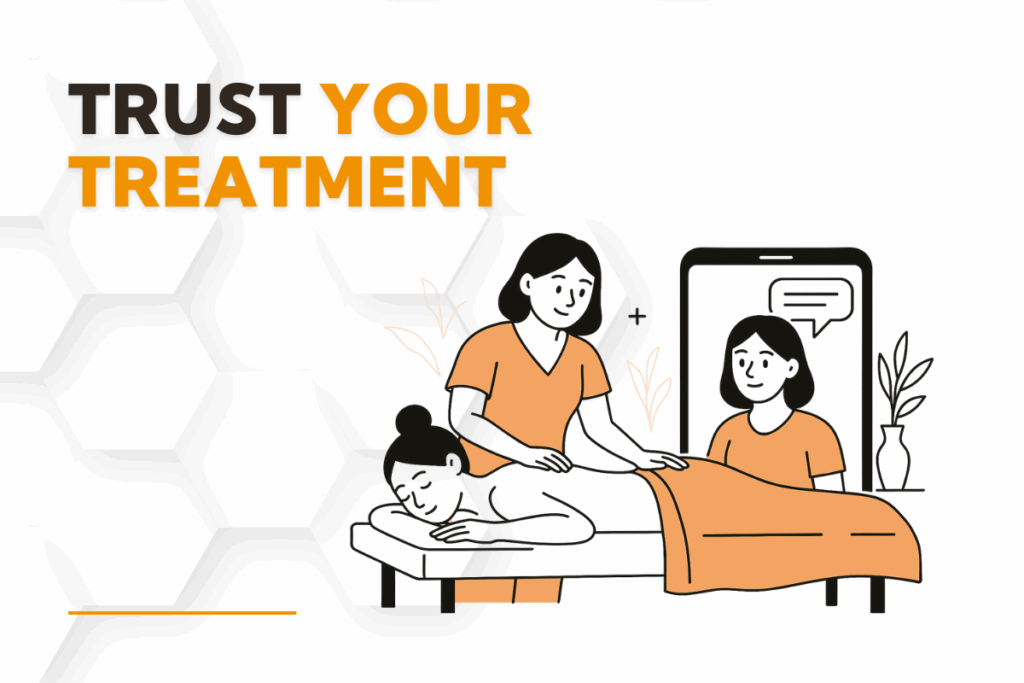Clients Trust Online Advice More Than Ever—And It’s Showing Up in the Treatment Room
Clients trust online advice more than ever, and as a massage therapist, you’ve likely felt the impact. You recommend a plan based on your training and hands-on assessment, only to hear, “That’s not what I read online.” It’s frustrating, disheartening, and it chips away at the trust that supports effective treatment.
Whether the client saw a viral video or got suggestions from a chatbot, their confidence in digital advice is often stronger than their confidence in the person treating them. And that can throw the entire session off balance.
Why Clients Are Putting Their Faith in the Internet
Health Misinformation is Everywhere
Clients trust online advice because it’s easy to find and always available. But the information they’re getting is often generalized, not rooted in clinical experience, and not tailored to their body. Unfortunately, most clients don’t know how to tell the difference.
Self-Diagnosis Feels Empowering
People want to feel in control. When clients research symptoms and show up with their own “diagnosis,” it gives them a sense of authority. That sense of control can make your recommendation feel like a challenge—even when it’s exactly what they need.
When Professional Advice Gets Overruled
You Start to Question Yourself
When clients trust online advice more than your assessment, it’s natural to feel shaken. You may catch yourself wondering if you should’ve explained things differently, or whether you should’ve adjusted your treatment just to keep the peace.
It Undermines the Relationship
Your job is to guide clients with care, but when they resist every recommendation, it stops feeling like a partnership. That kind of pushback, especially when repeated, can wear you down over time.

Practical Ways to Handle Client Pushback
Lead with Curiosity
Start by asking, “What did you read?” or “Can you tell me more about that?” This shows you’re open to understanding their concerns, not brushing them off.
Acknowledge Their Effort
It takes effort to research health concerns. Let them know you see that. You might say, “I’m glad you’re taking an active role in your care. Let me share why I’ve chosen this approach for your situation today.”
Explain the Difference Between General and Personalized Advice
Remind them that online advice is not always context-specific. You’re working with their body, their condition, and their goals. That’s something the internet can’t do.
Let Your Work Speak for Itself
Many therapists have stories of skeptical clients changing their minds after a great session. One clinic owner recalled a client who pushed back hard at the start but walked out saying, “That’s the best I’ve felt in months.” The therapist didn’t argue. She just stuck to her plan and let the results speak.
Clients trust online advice until they feel something better. That’s your edge. Trust the hands-on experience you’ve built.
Set the Tone Before the Session Starts
Use tools that frame your expertise from the first interaction. Custom online intake forms for massage clinics help you gather information while setting clear expectations around treatment planning. You can explore an option here: custom online intake forms.
This structure makes it easier to talk through your plan—and helps clients see that your recommendations are rooted in evidence, not guesswork.

Keep the Conversation Open
Let Clients Be Part of the Process
Invite them to participate in decision-making when appropriate. Ask what areas they’d like to focus on. Give them simple explanations about what you’re doing and why. When clients feel heard, they’re more likely to trust you—even when your plan doesn’t match what they expected.
Support Consistency and Trust with Reliable Systems
Using automated appointment scheduling for massage therapists ensures clients know what to expect. It reinforces professionalism and removes the uncertainty that often sends people searching online in the first place. Learn more about automated appointment scheduling for massage therapists.
You Can’t Control the Internet—But You Can Rebuild Trust
Clients trust online advice because it’s everywhere. But when you show up consistently, listen openly, and guide them with experience and care, you remind them what real support feels like.
You don’t need to match what they read. You need to show them what works. Let your results build trust over time.
FAQs
Because it’s convenient, accessible, and gives them a sense of control. Most clients aren’t trained to spot misinformation or understand how generalized content can miss the mark.
Stay calm, ask questions, and explain your plan clearly. Avoid confrontation. Frame your approach as personalized to their body and goals.
Start building more structure into your intake process and client education. Use tools that help set expectations early and present your treatment plan with clarity.
Yes, if not handled with care. But consistent communication, results, and professionalism will build trust—and help you stand out from impersonal advice online.


